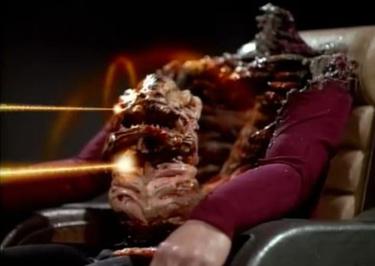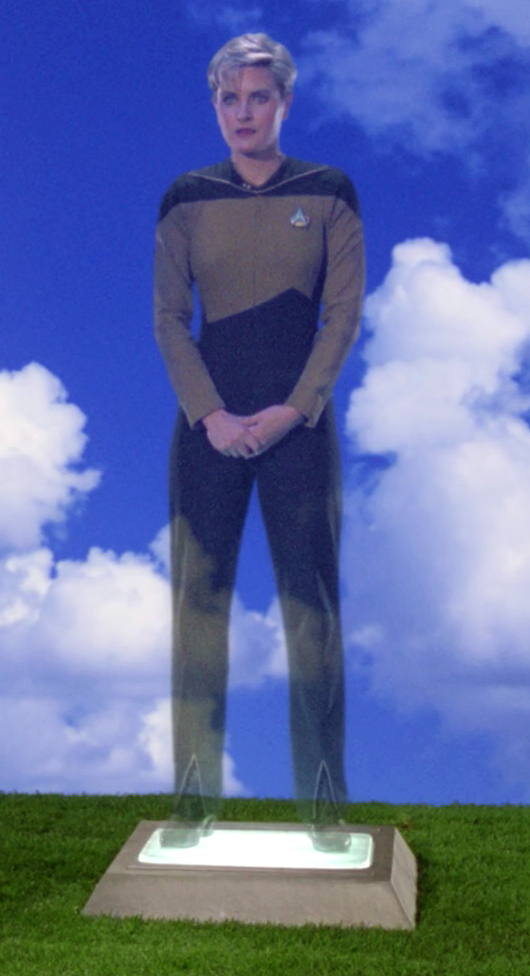It’s been almost a year since the wife and I embarked on the quest to marathon-watch all of Star Trek: The Next Generation. We’re rounding the bend now, so I thought I’d do the proper thing and vent my thoughts on the Internet like so much opinionated exhaust gas.
This show began in 1987, and ran for seven seasons with 26 episodes each. We started at the very beginning, and endeavored to watch every episode through to its end. So without further ado, let us catalog our findings as we boldly went where very many nerds have gone before!
Season 1

Holy shit. This is bad.
This is really bad.
Our overall verdict after finishing this season on a marathon run was “this show was lucky get renewed.” We found ourselves wondering what it was up against at the time, since syndicated TV of the 80s didn’t really have the production values we enjoy nowadays. Well, according to Wikipedia, here are the top 10 rated shows from 1987.
- The Cosby Show
- A Different World
- Cheers
- The Golden Girls
- Growing Pains
- Who’s the Boss?
- Night Court
- 60 Minutes
- Murder, She Wrote
- The Wonder Years
OK, that provides some context.
Note that TNG isn’t on that list. Because it was syndicated, it doesn’t appear in the network television ratings ranks. But (again according to Wikipedia), “The new show indeed performed well; the pilot’s ratings were higher than those of many network programs, and ratings remained comparable to network shows by the end of the first season despite the handicap of each station airing the show on a different day and time, often outside prime time.”
So, it was a popular and well-received season, and even won a few Emmy awards. I don’t think people of the time were wrong to appreciate it thusly, but it does show you how much the world of science fiction television has changed since the halcyon days of The Next Generation’s premier.
This season, TNG won awards for Outstanding Sound Editing for the episode “11001001”, Outstanding Costume Design for “The Big Goodbye,” and Outstanding Achievement in Makeup for “Conspiracy.” I wasn’t even aware that some of those were awards, but there you go. What made them special?

“11001001” featured a race of partially cybernetic being who communicate mostly in auditory binary, which doesn’t make a ton of sense, but is fascinating in a life-but-not-as-we-know-it kind of way. Even though it features another Riker the Horndog arc, his role is tastefully handled. It might very well by favorite episode from this season. But for the life of me I have no idea why it won an Emmy for Outstanding Sound Editing.

“The Big Goodbye” did have decent costumes; the cast was all done up in film noire style garb because it was a holodeck episode. I never like holodeck episodes but the fact that it picked up an Emmy maybe explains why they utilize them: there’s clearly an appeal to the idea of breaking up the monotony by picking literally any setting and just running with it. I tend to write off holodeck episodes because they tend to be non sequiturs or just nonsense, though.

“Conspiracy” is the penultimate episode of the season, and honestly I enjoyed it! Apparently this episode’s airing caused a bit of a stir because the of surprisingly graphic violence of a single climactic scene that lasts about 10 seconds. I don’t disapprove of violence in media, but I totally get the shock that came with this. It comes out of nowhere and is about 10 shades darker than any other content in the rest of the season. Maybe even the series as a whole. I’m not sure why they did this. Perhaps to make waves. And to win Outstanding Achievement in Makeup. Which it did.
But exploding torsos aside, this episode had tension, an acceptable amount of treknobabble, and characters overcoming the odds through teamwork and guile. It’s far from the worst way to end the season. That’s not exactly a ringing endorsement, but you take what you can get here.
So, those are the high points. Unfortunately not every entry into this season was so shiny. We see the emergence of a pattern in these early episodes: an attempt at an interesting idea lost in poor execution. “Code of Honor,” for example, almost touches on themes of cultural relativism but quickly gets bogged down by a script that is covertly sexist and overtly racist.
We are introduced to the Ferengi as a primary adversary, and it’s painful to watch. A greedy materialistic and profit-driven race is an obvious attempt at making an uncanny caricature modern human society. But in this 24th Century post-scarcity society, it doesn’t make sense. What makes even less sense is the fact that every interaction with them involves the Ferengi perpetrating multiple acts of war against the Federation and Starfleet. And we can only assume they’ve behaved as badly in their encounters with every other race in the quadrant. There isn’t a clear reason why they haven’t been phasered back into the stone age at this point. Their replacement by the far-more-interesting Borg, introduced much later in the series, was entirely welcome.
What really nags me is how Denise Crosby’s character, Tasha Yar, is killed in action (apparently because the actress she wanted out). Mind you, I’m not upset that her character died. I’m upset with how it was handled. At the end of the episode the cast finds a recording from Tasha. One with a message to each and every named cast member, which apparently she recorded just in case this exact thing were to happen. Thus providing closure and solace in the face of such a loss. “Hey guys, it sucks that I’m dead now, but everything’s going to be okay because you’re all great folks.”

No. No no no. You were so close and then you ruined it. They shouldn’t get off that easy. That’s not how life works. If you want to give this moment weight, they don’t get closure. They don’t get to wrap it all up in a feel-good blanket at the end. One of their fellow crew members died for no fucking reason. She’s gone, and they’re never going to see her again. It’s senseless, it’s tragic, and it just as easily could have happened to any one of them on any number of these dangerous missions. We could have gotten to watch each character come to terms with this over the remainder of the season, grappling with the loss in their own way, or maybe watch them never get over it. But, no, this is what we got instead. It might seem like a minor issue to harp on, but I see the problem as a symptom of trying way too hard to fit into a procedural formula despite having to deal with the permanence of cast attrition.
Rant over.
Okay, so this season, things were a little rough. Upon review, it feels like done I’ve far more complaining than praising. But as I said earlier, this series debuted with an overall positive reception and good ratings. So is this all unfair? Is it legitimate to criticism television, science fiction especially, outside of the context of its time? Are people ten years from now going to look back on Babylon 5 and say “I can’t believe people thought this was good TV?” I’m not sure. I want to believe that great art has staying power. And I know for certain that if this show were to air today, it would need to put forth an astounding turnaround in its second season.
And as Stephanie and I have learned…it did not.